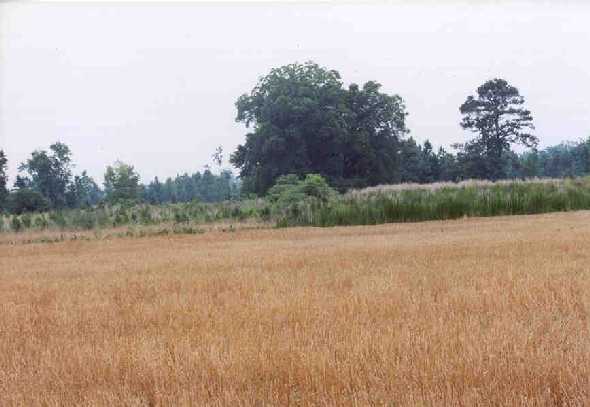
Meadowbrook Farms consists of 350 acres managed by Monnie English, the first female descendant to claim ownership of the homestead. Her father, the late Bill McLaurin, former County Executive Director for Marlboro ASCS, now Farm Service Agency (FSA), instilled a strong sense of family heritage and pride of land ownership in the family, and this has inspired English to conserve the natural resources on her land. English looked to USDA-Natural Resources Conservation Service (NRCS) for technical assistance through the Conservation Reserve Program (CRP). With guidance from NRCS District Conservationist Teresa Babb, Meadowbrook Farms has planted over 40 acres of riparian buffers. The program helps farmers reduce soil erosion and sedimentation in streams and lakes, improves water quality, establishes wildlife habitat, and enhances forest and wetland resources. It also encourages farmers to convert highly erodible cropland or other environmentally sensitive acreage to vegetative cover, such as native grasses, wildlife plantings, trees, filterstrips, or riparian buffers. Farmers receive an annual rental payment for the term of the multi-year contract. Cost sharing is provided to establish the vegetative cover practices.For many, the idea of conserving our natural resources and preserving wildlife habitat is most likely a passing thought. Only those who are truly dedicated to the strengthening of our environment consider conservation as a way of life on their farms. This type of dedication can be found in Bennettsville, SC, at Egypt Farms. The ten gentlemen who share ownership of this farm are approaching their third season in the USDA Conservation Reserve Program (CRP). They, with the technical expertise of NRCS District Conservationist Teresa Babb, have converted 107 of their 933 acres of cropland into a serene retreat for wildlife, which includes 150 feet of riparian buffer, a 15-acre sunflower field and a 10-acre duck pond. Blackwell and his partners transformed 10 acres of planted corn into an 18-24 in. deep duck pond. “Before we made the pond, there were absolutely no ducks on this farm,” said Blackwell. “But now, over 1000 ducks, as well as local birds, have migrated here. “ Blackwell and his partners fill the pond at the end of September and drain it in mid-March. For the remainder of the year, the pond maintains planted corn, millet and native vegetation for the ducks. Although preserving the wildlife habitat was a major concern at Egypt Farms, protecting water quality also was a major effort. “By placing riparian buffers on the cropland, they have provided a barrier between the crops and the adjacent Crooked Creek and Pee Dee River,” said Babb, Natural Resources Conservation District Conservationist. The riparian buffers provide a number of benefits. They are excellent filters and will stop or slow down surface water and trap sediment and chemicals from entering our waters. They provide excellent food and habitat for wildlife. These buffer plantings included Cherry Bark Oak and Loblolly Pine, Switchgrass, Kobe Lespedeza, and Partridge Pea. “ I would recommend CRP and other USDA cost-share programs to anyone who enjoys wildlife and can put a few acres into a conservation easement,” said Blackwell. “You can’t always think about today, but you must plan for tomorrow.”
COMMISSIONERS AND WATERSHED DIRECTORS TAKE OFFICE
Two Marlboro Soil and Water Conservation District Commissioners and two Carters Branch/Muddy Creek Watershed Directors now have officially taken office as a result of being elected in the November, 2002 General Election. They are shown above taking their oaths of office from South Carolina Department of Natural Resources Representative John Alford. Frank Hinson and Billy Covington were reelected to four year terms on the Marlboro Conservation District Board. Their new terms of office will expire in January, 2007. Jennie Lee B. Fowler and John M. Lane also were reelected to four year terms as Carters Branch/Muddy Creek Watershed Directors. Their new terms of office will expire in December, 2006. There are three additional Marlboro Conservation District commissioners-Michael O’Tuel, T. A. O’Neal, Mack Helms and one associate-Regina Smith. O’Tuel and O’Neal are appointed to their four year terms by the Board of the South Carolina Department of Natural Resources in Columbia, South Carolina. Helms is also an elected commissioner. The three additional Carters Branch/Muddy Creek Watershed Directors are Ray Smith, Jr., Lonnie B. Ward and James R. Dixon. All watershed directors hold elected positions. All positions on the elected Marlboro Conservation District Board and the Carters Branch/Muddy Creek Watershed Board are staggered so all are not up for reelection at the same time. The management and conservation of the Marlboro District’s natural resources are a major focus of the Marlboro District’s commissioners. The ongoing maintenance of the Carters Branch/Muddy Creek Watershed drainage area is a top priority of its directors.